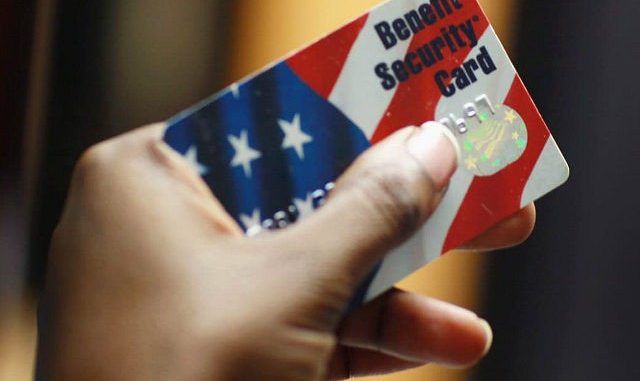
More than half a million people dropped off the food stamp rolls in a single month, according to the latest figures from the U.S. Department of Agriculture (USDA).
The USDA data reveals that a total of 587,792 people discontinued their participation in the Supplemental Nutrition Assistance Program (SNAP) between December 2017 and January 2018.
Widget not in any sidebars
The latest numbers show that on the whole, food stamp enrollment has been on a steady decline for the first quarter of fiscal year (FY) 2018, which began in October 2017.
Here is the breakdown of how many people dropped off the food stamp rolls each month of the fiscal year (FY) 2018:
- October to November- 4,008,165
- November to December- 329,584
- December to January- 587,792
Although enrollment in SNAP sharply increased by more than 3 million during the first month of the fiscal year (FY) 2018 (October 2017) due to temporary SNAP enrollment in hurricane-affected states, it dropped by more than 4 million the following month.
The decline came as states curtailed their temporary SNAP benefits in the months following Hurricanes Harvey and Irma.
President Trump mentioned in 2017 that he wanted to make it a priority to keep SNAP program costs down at the state and federal levels, which if implemented, could cause enrollment to decline even more this year as the administration releases its plans to reform the federal welfare system.
While efforts to curb food stamp enrollment at the state level and get people back into the workforce have been underway over the past few years, the federal government has been trying to take those state-level reforms nationwide.
The Trump administration released an executive order on welfare reform this week that would require agencies such as the Department of Agriculture to issue updated rules for those receiving benefits.
The executive order would direct agencies to issue stricter requirements for those receiving benefits—such as limiting the amount of time people receive benefits without working—and invest in more federal programs that would enable welfare recipients to get back into the workforce.
“Since its inception, the welfare system has grown into a large bureaucracy that might be susceptible to measuring success by how many people are enrolled in a program rather than by how many have moved from poverty into financial independence,” the executive order states.
The Department of Agriculture has also been trying to ramp up its efforts to reform the federal welfare system over the past few months.
The agency proposed a “Blue Apron-style” food stamp program in February that would deliver shelf-stable food—such as cereal boxes, pasta, and canned produce—to food stamp recipients once a month.
The “Harvest Boxes” would make up half of recipients’ allotted benefits for the month while the other half would consist of SNAP benefits on electronic benefit transfer (EBT) cards. The agency clarified that states in charge of delivering the boxes would take recipients’ dietary and religious preferences into account when selecting the type of food for the boxes.
The Genius Of Trump’s Food Stamp Proposal: You’re Not Supposed To Like Being On Welfare
Trump signs order calling for work requirements in welfare programs




Be the first to comment